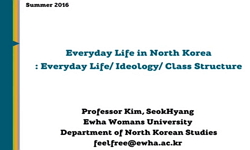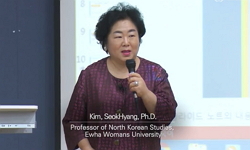The purpose of this study is to examine how elementary school science textbooks are designed to facilitate students’ inquiry abilities in South and North Korea. For this, we investigated the weight of sub-area science in the entire units, the tenden...
http://chineseinput.net/에서 pinyin(병음)방식으로 중국어를 변환할 수 있습니다.
변환된 중국어를 복사하여 사용하시면 됩니다.
- 中文 을 입력하시려면 zhongwen을 입력하시고 space를누르시면됩니다.
- 北京 을 입력하시려면 beijing을 입력하시고 space를 누르시면 됩니다.

남북한 초등학교 3학년 과학 교과서 비교 - 탐구 경향성을 중심으로 - = An Analysis of Elementary Science Textbooks for Grades 3 in South and North Korea - Focused on Inquiry Tendency -
한글로보기https://www.riss.kr/link?id=A107374937
- 저자
- 발행기관
- 학술지명
- 권호사항
-
발행연도
2021
-
작성언어
-
- 주제어
-
등재정보
KCI등재
-
자료형태
학술저널
- 발행기관 URL
-
수록면
69-80(12쪽)
-
KCI 피인용횟수
1
- DOI식별코드
- 제공처
-
0
상세조회 -
0
다운로드
부가정보
다국어 초록 (Multilingual Abstract)
The purpose of this study is to examine how elementary school science textbooks are designed to facilitate students’ inquiry abilities in South and North Korea. For this, we investigated the weight of sub-area science in the entire units, the tendency of inquiry using Romey’s analysis method, differences in the composition of units to improve inquiry capabilities, and differences in how concepts and inquiry are applied to solve real-life problems. As a result of the analysis, North Korean science textbooks showed different weights in each area of physics, chemistry, biology, and earth science. The inquiry tendency of South Korean and North Korean textbooks was similar, but North Korean textbooks were described more exploratively in visual materials than South Korea. South Korean textbooks suggested more diverse inquiry activities than North Korean textbooks. North Korean textbooks are more exploratory in the title of the unit, while South Korean textbooks are concept-oriented and abstract. North Korean science textbooks provided opportunities to use concepts and inquiry skills learned to solve real-life problems. As a result of this study, it can be seen that elementary school science textbooks in South Korea and North Korea show differences in their tendency of inquiry. The findings are expected to contribute to the development and improvement of the next curriculum and textbooks.
참고문헌 (Reference)
1 권치순, "한국과 핀란드 초등과학 교과서의 체제와 내용 비교 분석" 대한지구과학교육학회 4 (4): 134-141, 2011
2 최도성, "한국과 미국 초등학교 과학과 교육과정 및 교과서 비교 연구" 초등교육연구원 24 (24): 151-166, 2013
3 진의남, "중등학교 교과서 선정을 위한 평가 기준 및 척도 개발" 한국실과교육연구학회 16 (16): 43-66, 2010
4 이봉우, "우리나라 3-10학년 과학 교과서에 나타난 기초탐구과정 분석 : 관찰 및 측정 탐구요소를 중심으로" 한국과학교육학회 27 (27): 421-431, 2007
5 김중복, "실생활 소재 과학 탐구 모듈이 중학생의 과학 탐구 능력과 실험 활동에 대한 태도에 미치는 효과" 한국과학교육학회 25 (25): 811-819, 2005
6 심재호, "북한의 고급중학교1 생물과 남한의 생명과학1 교과서의 내용 특징 비교 분석" 한국생물교육학회 48 (48): 48-62, 2020
7 박현주, "북한 김정은 시대의 고급중학교 1 화학 교과서의 탐구 경향성 분석" 대한화학회 63 (63): 266-279, 2019
8 잉그리트 미테, "동-서독의 차이와 지배문화: 독일 통일 30년의 재평가를 위한 제언" 비판사회학회 (125) : 162-188, 2020
9 Kim, Y. M., "World of the Science Education" Bookshill 2014
10 Shin, Y. C., "The integration process of education after the German Unification" 1 : 209-237, 1994
1 권치순, "한국과 핀란드 초등과학 교과서의 체제와 내용 비교 분석" 대한지구과학교육학회 4 (4): 134-141, 2011
2 최도성, "한국과 미국 초등학교 과학과 교육과정 및 교과서 비교 연구" 초등교육연구원 24 (24): 151-166, 2013
3 진의남, "중등학교 교과서 선정을 위한 평가 기준 및 척도 개발" 한국실과교육연구학회 16 (16): 43-66, 2010
4 이봉우, "우리나라 3-10학년 과학 교과서에 나타난 기초탐구과정 분석 : 관찰 및 측정 탐구요소를 중심으로" 한국과학교육학회 27 (27): 421-431, 2007
5 김중복, "실생활 소재 과학 탐구 모듈이 중학생의 과학 탐구 능력과 실험 활동에 대한 태도에 미치는 효과" 한국과학교육학회 25 (25): 811-819, 2005
6 심재호, "북한의 고급중학교1 생물과 남한의 생명과학1 교과서의 내용 특징 비교 분석" 한국생물교육학회 48 (48): 48-62, 2020
7 박현주, "북한 김정은 시대의 고급중학교 1 화학 교과서의 탐구 경향성 분석" 대한화학회 63 (63): 266-279, 2019
8 잉그리트 미테, "동-서독의 차이와 지배문화: 독일 통일 30년의 재평가를 위한 제언" 비판사회학회 (125) : 162-188, 2020
9 Kim, Y. M., "World of the Science Education" Bookshill 2014
10 Shin, Y. C., "The integration process of education after the German Unification" 1 : 209-237, 1994
11 Chiang-Soong, B., "The inclusion of STS material in the most frequently used secondary science textbooks in the U.S." 30 (30): 339-349, 1993
12 MOE(Ministry of Education), "The Compilation Commission of State-Published Textbooks" The Visang Education 2018
13 KICE(Korea Institute for Curriculum and Evaluation), "Science Curriculum Revision Research and Development Direction and Status" KICE 38-, 2005
14 김지영, "Romey 분석법을 활용한 국어교과서의 탐구 경향 탐색 - 초등학교 문법 단원을 중심으로 -" 한국국어교육학회 (107) : 67-86, 2016
15 김은정, "Romey 분석법을 활용한 2015 개정 실과 교과서 ‘생활 안전사고의 예방’ 단원의 탐구 경향 분석" 한국실과교육학회 32 (32): 1-18, 2019
16 Kang, O. H., "Parallel & distributed computing: Analysis of inquisitive tendency of 2009 revised middle school informatics textbooks" 4 (4): 219-226, 2015
17 Romey, W. D., "Inquiry Techniques for Teaching Science" Prentice-Hall 1968
18 Schwartz, R. S., "Developing views of nature of science in an authentic context: An explicit approach to bridging the gap between nature of science and scientific inquiry" 88 (88): 610-645, 2004
19 Min, J. H, "Comparative analysis of the inquiry of life science I textbooks between the revised science curriculum 2009 and 2015 by Romey's method" Pusan National University 2020
20 Hong, S. J, "Analysis of inquiry-based high school physics Ⅱ textbooks of the 7th curriculum using Romey's method" Inha University 2008
21 Kwon, J. Y, "Analysis of inquiry status of the lowerlevel and the higher-level middle school science textbooks of Kim Jong-Un Era in North Korea" Chosun University 2020
22 Park, S. W., "A plan to secure the driving force for new industrial policies for innovative growth" 29 (29): 3-9, 2020
23 Choi, J. J., "A comparative study on contents and inquiry activities in elementary science textbooks between Korea and Singapore" 23 : 144-126, 2010
24 Jin, J., "A Study on the Improvement Plans of the Textbook Adoption System" Korea Authorized Textbook 2010
25 MEST(Ministry of Education, Science and Technology), "6th Grade 1st Semester Social Textbook" Doosan Dong-A 2011
26 김태형, "2015 개정 교육과정에 따른 「통합 사회」 교과서의 탐구 성향 분석 - Romey 기법을 통하여 -" 한국지리환경교육학회 27 (27): 53-68, 2019
27 송신철, "2015 개정 과학과 교육과정에 따른 초등학교 과학 교과의 탐구활동 유형 분석- 3~4학년군 과학 교과서를 중심으로 -" 한국생물교육학회 47 (47): 310-323, 2019
동일학술지(권/호) 다른 논문
-
과학 교사 교육자의 역할에 대해 야누스적 관점으로 전환하기
- 한국생물교육학회
- 김동렬 ( Dong-ryeul Kim )
- 2021
- KCI등재
-
생명과학 수업 중 재미 경험에 대한 현상학적 해석 - 고등학교 수업을 중심으로 -
- 한국생물교육학회
- 신세인 ( Sein Shin )
- 2021
- KCI등재
-
청중의 도출을 통한 예비교사의 인식적 행위주체성 촉진 지식 구성 활동의 개발
- 한국생물교육학회
- 하희수 ( Heesoo Ha )
- 2021
- KCI등재
-
전국 시ㆍ도교육청 교원 연수기관의 과학교육 관련 교원 직무연수에서의 과학 교사 전문성 요소 및 과학교육 개혁 동향 반영에 대한 분석
- 한국생물교육학회
- 양윤영 ( Yun Young Yang )
- 2021
- KCI등재
분석정보
인용정보 인용지수 설명보기
학술지 이력
| 연월일 | 이력구분 | 이력상세 | 등재구분 |
|---|---|---|---|
| 2027 | 평가예정 | 재인증평가 신청대상 (재인증) | |
| 2021-01-01 | 평가 | 등재학술지 유지 (재인증) |  |
| 2018-01-01 | 평가 | 등재학술지 유지 (등재유지) |  |
| 2015-01-01 | 평가 | 등재학술지 유지 (등재유지) |  |
| 2014-09-02 | 학회명변경 | 영문명 : 미등록 -> The Korean Society of Biology Education |  |
| 2012-03-27 | 학술지명변경 | 한글명 : 한국생물교육학회지 -> 생물교육외국어명 : THE KOREAN JOURNAL OF BIOLOGY EDUCATION -> BIOLOGY EDUCATION |  |
| 2011-01-01 | 평가 | 등재학술지 유지 (등재유지) |  |
| 2009-01-01 | 평가 | 등재학술지 유지 (등재유지) |  |
| 2008-10-02 | 학술지명변경 | 외국어명 : THE KOREAN JOURNAL OF BIOLOGICAL EDUCATION -> THE KOREAN JOURNAL OF BIOLOGY EDUCATION |  |
| 2006-01-01 | 평가 | 등재학술지 선정 (등재후보2차) |  |
| 2005-01-01 | 평가 | 등재후보 1차 PASS (등재후보1차) |  |
| 2003-07-01 | 평가 | 등재후보학술지 선정 (신규평가) |  |
학술지 인용정보
| 기준연도 | WOS-KCI 통합IF(2년) | KCIF(2년) | KCIF(3년) |
|---|---|---|---|
| 2016 | 0.96 | 0.96 | 0.88 |
| KCIF(4년) | KCIF(5년) | 중심성지수(3년) | 즉시성지수 |
| 1.02 | 0.93 | 1.199 | 0.58 |





 KCI
KCI KISS
KISS






